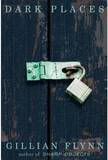 Shaye Areheart Books / May 2009
Shaye Areheart Books / May 2009
Reviewed by: Martel Sardina
The cover of Gillian Flynn’s debut novel Sharp Objects piqued my interest when I saw it on the shelf at my local library. While I don’t usually judge a book by its cover, the image of a razor blade on a black background reminded me of one of my favorite metal albums, Judas Priest’s British Steel — which in and of itself warranted a quick glance at the dust jacket copy and blurbs. The premise interested me enough to give Flynn a try.
To say that I liked her debut would be an understatement. I raved about it then and have been waiting (im)patiently for Ms. Flynn to hurry up and put out something new. After nearly three years, Dark Places is finally here. The question is: was it worth the wait?
When Flynn introduces Libby Day, the reader is immediately sympathetic toward her. When Libby was seven, her mother and two sisters were brutally murdered. Libby witnessed the murders and managed to escape into the harsh January night, losing a couple of toes in the process.
Libby is in her thirties now, still living in the shadow of her past. She’s depressed, out of work, and just learned that her trust fund has run out. She’s so caught up in the life that was taken from her, that she can barely function is the life that she has. She doesn’t have many family members to turn to for help. Her father, Runner, is a deadbeat. Her Aunt Diane isn’t speaking to her. And her only other relative – her brother Ben – has been in jail since that fateful night. Libby’s eyewitness testimony put him there.
When Libby receives a letter requesting a public speaking engagement, she agrees thinking it will be a way to make some quick cash. Lyle, the event’s organizer, assures Libby that it will be a pleasant evening and all she’ll have to do is answer a few questions from a group of people who have spent the last twenty odd years following her case. Libby expects to be speaking to a group of sympathizers and is shocked when audience members have the audacity to suggest that her brother is innocent. They claim to have proof, telling Libby that the prosecution tricked her into identifying Ben as the murderer. Trouble is, Libby was there that night. They weren’t.
Libby leaves the event angry. Lyle apologizes and begs her to look at the group’s files. To merely consider the possibility that she was wrong. Libby isn’t interested in revisiting the details of that horrible night until she learns that members of Lyle’s group are willing to pay her handsomely to scare up old ghosts.
At first, Libby is motivated by greed. But as she starts digging deeper, talking to people from her past, the details aren’t fitting together quite as nicely as they did when she was seven. She begins to doubt Ben’s guilt and wants to know what really happened that night.
What follows is the unraveling of great mystery. Flynn keeps the reader turning pages by alternating viewpoint characters and timelines. While most of the narrative is focused on Libby in the present, Flynn also gives readers glimpses into the past, relaying the events leading up to the murders from Ben’s (as a teenager) and their now-deceased mother’s point of view.
Flynn’s writing is brutal. Some criticize her for writing about unlikable people. I won’t take her to task for that. As a reader and a reviewer, I want characters that are believable. I don’t have to like them as people. But I do have to believe in them, believe in the motivations for their actions. Flynn succeeds on both counts.
If nothing else, Dark Places certainly lives up to its name.
Purchase Dark Places by Gillian Flynn.